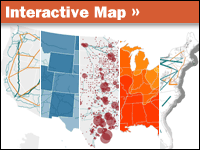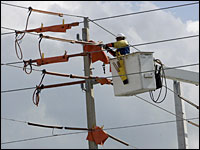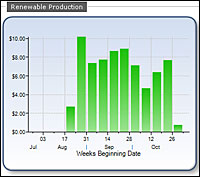 Power Industry Sees New Phase In Energy Use (Part 7)The seventh of a 10-part series Apr 30, 2009 - Jeff Brady - npr.org The U.S. electricity grid is in the midst of a revolution. It has a track record of 99.97 percent reliability, but there are plans for a massive overhaul of the grid to accommodate increasing demand and more renewable forms of energy, like wind and solar. While some proponents of changing the grid can be almost breathless in their enthusiasm, the utilities that will end up performing a lot of the work are a more conservative lot. "The traditional regulated utility has one job, and that's to keep the lights on," says Martha Duggan, vice president for government affairs at solar energy company SunEdison. Duggan, who began her career in the regulated utility world, likes to tell a story about a utility engineer who said the nature of his job was either to be ignored when the electricity was on, or criticized when it was off. "And so his goal, really, was to be ignored," Duggan says. "When you apply that kind of thinking across an organization — as you might imagine — the opportunity for creativity or new ideas is not necessarily in top of mind for folks who work in that environment." Room For Innovation Duggan says there are a few exceptions around the country. She points to Xcel Energy, which is in the process of creating the first smart grid for an entire city in Boulder, Colo. Just recently, Florida Power and Light launched a $200 million upgrade to the electricity grid in Miami-Dade County. But for most of the other utilities, there is an impression of big stodgy companies that are resistant to change "I think that's a total misperception," says David Ratcliffe, CEO of the Southern Company in Atlanta. "We've deployed a million new automated meters and will move to 4.5 million. We've deployed automated switching on our transmission and distribution networks." But take those automated — or smart — meters. It's not as simple as just ripping out the old ones and installing new ones, then charging the customer a little extra to cover the cost. Utilities, by and large, are still regulated monopolies, and big changes require approval. "There are all kinds of regulatory/financing issues here that the utilities are concerned they will not be able to collect all the money," says Ahmad Faruqui, an economist with the utility consulting firm The Brattle Group. Keeping The Lights On Such mundane issues might seem boring when placed next to all the exciting talk about a revamped electricity grid in the U.S. But even now, a utility CEO still sees his primary job as keeping the lights on. "It doesn't have the same kind of sex appeal as new technologies and new 'golly-gee-whiz' — whether it's a new computer software program or a new computer itself," Ratcliffe says. So don't expect the smart grid to be unveiled like the latest iPod — utilities will build out this updated grid methodically, as befits their conservative nature. Ratcliffe says change is under way. And there's a new generation of utility executives coming up through the ranks who tend to be more comfortable with change — and with the new technologies that will remake the country's electricity grid. |
Email this page to a friend
If you speak another language fluently and you liked this page, make
a contribution by translating
it! For additional translations check out FreeTranslation.com
(Voor vertaling van Engels tot Nederlands)
(For oversettelse fra Engelsk til Norsk)
(Для дополнительных
переводов проверяют
FreeTranslation.com )




